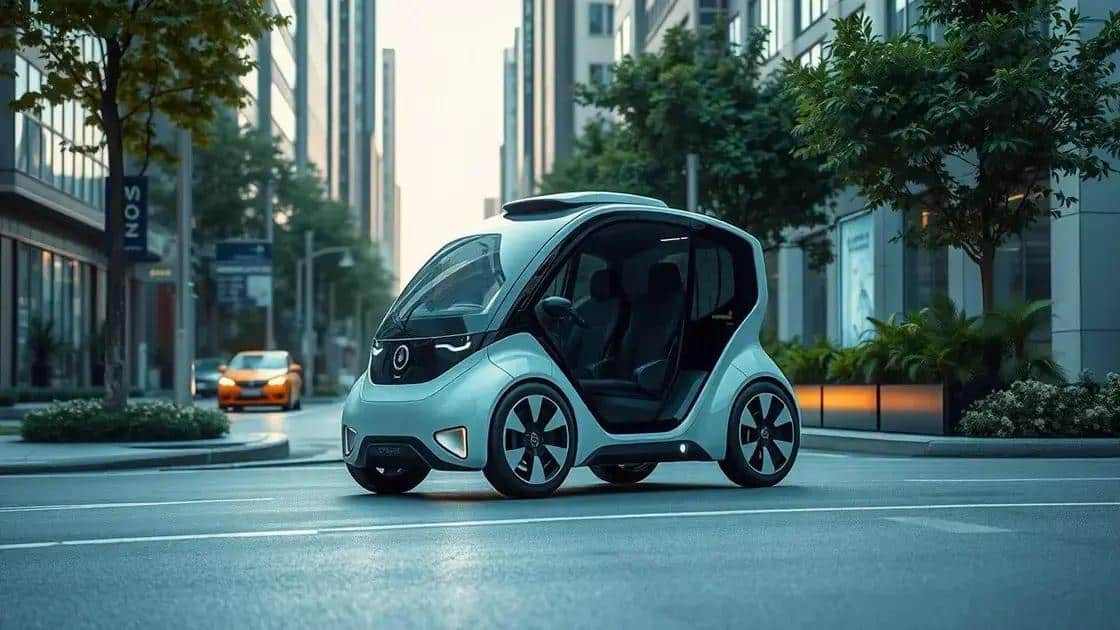Electric vehicle news trends: what’s driving changes?

Electric vehicle news trends include increasing consumer adoption, advancements in battery technology, and supportive government policies, all driving the future of sustainable transportation.
Electric vehicle news trends are reshaping the automotive sector, with innovations popping up daily. Are you curious about what’s influencing these shifts? Let’s dive into the latest developments and their implications.
Emerging technologies in electric vehicles
Emerging technologies in electric vehicles (EVs) are paving the way for a fascinating future in transportation. As the world shifts towards more sustainable options, innovation drives the growth of electric vehicles.
Battery Technologies
One of the key advancements in EV technology is the evolution of battery systems. New batteries use advanced materials to enhance performance and efficiency.
- Solid-state batteries promise greater energy density.
- Faster charging times are becoming the norm.
- Recycling methods are improving to reduce waste.
These developments create a more reliable driving experience and extend the range of electric vehicles. As a result, consumers can travel farther than ever without worrying about running out of charge.
Autonomous Driving
Another exciting area is the integration of autonomous driving technology in EVs. Companies are investing heavily in artificial intelligence to enhance safety and convenience.
Autonomous features, such as adaptive cruise control and lane-keeping assistance, are already common in many models. These systems not only reduce driver fatigue but also improve overall road safety.
Moreover, the fusion of EVs with autonomous technology enhances their appeal. Imagine a vehicle that drives itself while you relax or attend to other tasks.
Smart Grid Integration
EVs are also becoming integral to smart grid systems. By connecting electric vehicles to the grid, energy can be managed more efficiently.
- Consumers can charge their cars during off-peak hours.
- EVs can supply power back to the grid when needed.
- This creates a two-way energy exchange system, benefiting both users and providers.
The transition to smarter energy management supports the growth of renewable energies, making electric vehicles a key component in the shift towards a more sustainable future.
As we continue to witness these emerging technologies in electric vehicles, the future looks bright. Innovations not only make EVs more appealing but also enhance their practicality, driving us toward a greener tomorrow. Keep an eye on these trends as they unfold, shaping the automotive landscape for generations to come.
Government policies shaping the EV landscape

Government policies are a major force shaping the electric vehicle (EV) landscape. With a growing concern for climate change, many countries are prioritizing sustainable transportation options. These policies significantly impact how consumers and manufacturers approach electric vehicles.
Incentives for Consumers
Many governments offer various incentives to encourage people to buy electric vehicles. These incentives help make EVs more affordable and appealing.
- Tax credits reduce the cost of purchasing an EV.
- Rebates are available for home charging station installations.
- Some regions provide free parking or access to carpool lanes for EVs.
Such benefits play a critical role in boosting EV sales. As a result, more people are considering making the switch from traditional gasoline cars to modern electric models. This increase in demand encourages manufacturers to produce a wider range of electric options.
Regulatory Standards
In addition to incentives, regulatory standards also influence the EV market significantly. Governments are setting emission targets to reduce pollution and promote cleaner vehicles. These regulations challenge automakers to innovate and develop better technologies.
For example, strict fuel efficiency standards motivate manufacturers to invest in electric vehicle technology. Companies are racing to meet deadlines while maintaining competitive performance and safety. As consumers become more aware of environmental issues, the pressure to comply with these regulations intensifies.
International Agreements
International agreements on climate change, such as the Paris Agreement, further push countries toward adopting electric vehicles. These agreements encourage nations to commit to reducing greenhouse gas emissions, advancing electric vehicle adoption as a climate solution.
Country collaborations can lead to shared resources and best practices. Nations can learn from each other in terms of policy implementation and technological advancements, impacting the global EV market positively.
As we navigate this evolving landscape, it is clear that government policies are instrumental in shaping the future of electric vehicles. Through incentives, regulations, and international collaboration, governments play a crucial role in facilitating a sustainable automotive future for all.
Consumer preferences and market shifts
Consumer preferences are significantly driving the shifts in the electric vehicle (EV) market. As more people become aware of environmental issues, their choices reflect a desire for sustainable and eco-friendly transportation options.
Growing Demand for EVs
Recent surveys show that interest in electric vehicles is rising. Many consumers prefer EVs for various reasons.
- Lower operating costs compared to gasoline vehicles.
- Access to government incentives for purchasing.
- Innovative technology and features in EVs.
This growing demand pushes manufacturers to invest more in sustainable technologies, leading to a wider range of electric models available for consumers. Automakers are now designing vehicles that meet the specific needs and preferences of buyers.
Influence of Technology
As technology evolves, it impacts consumer preferences. People are drawn to electric vehicles equipped with the latest advancements. Features like smart charging, enhanced battery life, and autonomous driving capabilities attract buyers.
Moreover, the integration of technology into everyday life makes consumers demand more from their vehicles. They want connected cars that provide convenience and safety on the road.
This shift in expectations influences how manufacturers approach vehicle design and features.
Environmental Concerns
Another significant factor in consumer preferences is the growing concern for the environment. Many buyers consider the carbon footprint of their vehicles. As awareness of climate change increases, the desire for zero-emission vehicles strengthens.
This trend encourages consumers to switch from traditional cars to electric options, which are often seen as a better alternative for the environment. Companies recognize this shift and are responding with greener practices in production and logistics.
As the electric vehicle market continues to expand, understanding consumer preferences remains crucial for manufacturers. Awareness of these shifts allows automakers to adapt and innovate, ensuring they meet the changing demands of the market.
Future predictions for electric vehicle trends

Future predictions for electric vehicle trends indicate significant changes in the automotive landscape. As technology advances and consumer preferences shift, experts foresee a transformative journey ahead for electric vehicles.
Increased Adoption Rates
Many analysts forecast a dramatic increase in the adoption of electric vehicles in the coming years. As awareness grows, more consumers will likely choose EVs for their environmental benefits and lower running costs.
- Projections suggest that EV sales could reach over 30% of the market by 2030.
- Affordability will rise as battery technology improves and production scales up.
- Government policies and incentives will continue to support this growth.
This shift in sales will lead automotive manufacturers to expand their electric vehicle offerings, resulting in a greater variety of models for consumers.
Advancements in Battery Technology
Another essential trend is the advancement of battery technology. Future innovations will focus on enhancing performance and sustainability.
Solid-state batteries are expected to become more common, providing longer ranges and faster charging times. As a result, the driving experience will improve, making electric vehicles even more appealing.
Researchers are also exploring new materials that could make batteries more efficient and cost-effective while minimizing environmental impact.
Enhanced Infrastructure Development
The growth of electric vehicles will coincide with significant improvements in charging infrastructure. As EV ownership rises, more charging stations will become available.
- Fast-charging networks will expand, reducing range anxiety for drivers.
- Public and private sectors are investing in charging solutions.
- Smart charging systems will optimize energy use during peak and off-peak hours.
This enhanced infrastructure will facilitate the transition to electric vehicles, making them an attractive option for more consumers.
As we look forward to the future of electric vehicles, understanding these trends will be crucial for consumers, manufacturers, and policymakers alike. The landscape of transportation is evolving, and electric vehicles will undoubtedly play a central role in this transformation.
In conclusion, the electric vehicle (EV) market is experiencing rapid changes driven by technology, consumer preferences, and government policies. As more people recognize the benefits of electric vehicles, we can expect significant growth in adoption rates and advancements in battery and charging technologies. The future looks bright for electric vehicles, with expectations of expanded infrastructure and innovative features that will make driving more enjoyable and efficient. Embracing these changes can lead to a more sustainable and eco-friendly transportation system for all.
FAQ – Frequently Asked Questions about Electric Vehicles
What are the main benefits of electric vehicles?
Electric vehicles offer lower operating costs, reduced emissions, and often include various government incentives to encourage adoption.
How will battery technology change in the future for EVs?
Future advancements in battery technology, such as solid-state batteries, will lead to longer ranges, faster charging times, and greater efficiency.
What role does government policy play in promoting EV adoption?
Government policies include incentives for consumers, emissions regulations for manufacturers, and investments in charging infrastructure, all of which support EV adoption.
How is consumer preference affecting the EV market?
As consumers become more environmentally conscious, they prefer electric vehicles, pushing automakers to expand their electric offerings and innovations.





